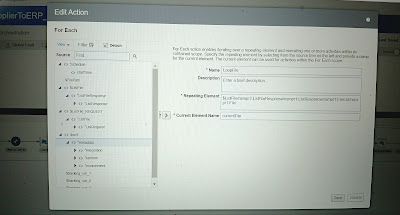Usecase: Here, we will see how to call ERP rest API and import FBDI data and also check import status.
Here., we will import supplier data.
References:
Follow below oracle page for Rest api details:
https://docs.oracle.com/en/cloud/saas/financials/24b/farfa/op-erpintegrations-post.html
https://docs.oracle.com/en/cloud/saas/financials/24b/farfa/op-erpintegrations-operationname-get.html
ImportBulkData Operation:
Sample Request body:
{
"OperationName":"importBulkData",
"DocumentContent":"UEsDBBQAAAAIAHSsJUWkOHOwEwEAAHgDAAAXAAAAQXBJbnZvaWNlc0ludGVyZmFjZS5jc3bV0LFOwzAQBuAdiXewOjBdU5/ts+MxNICCIEKEIjEG4SEijUrsCMHT47ZEqpCyIBj6Tzf8urM/JETOORSXV+x88E3nvGerrgmwvMmK2wrGgraWJwIER7VAseAGgvPBdcH1m77xjj3X3Ss7Y6EffAAtSBmEVFhjJKyqHN4AqoeszLP7HID0HEmmljRk5RMU67V7aergIGa8IHE/x1NxPhwngsBjBBdG8jlCAn+XizI/PdlJSDtNNRZQUnzI90f4SLWph5aFiOR637qPSJRK5JBKo8SeqD4kknoutFWpmiCKa39LhAqJ4vp/IlJymmgskP5JNNsaPTauZXcJW9b+3bUtsOs+mW2ljKQolRKpndTn0Ut9AVBLAwQUAAAACAAze2pIXdvnRHQAAACpAAAAEQAAAEFQVEVTVC5QUk9QRVJUSUVTdYrBCoMwEER/Reg1sPQTQgklYFVoatvjNqSwEDYhK4J/b9CrXmYeMy8V9DEA5iwQROBPjOwJo0DGBX8xCBDPiXyFqSAL+okSi9LDx9rH4Co483Tq0r3aVo0k9W36HApu3r6fpu3G3t5Mc9fOvPX3wLjuvQJQSwECFAAUAAAACAB0rCVFpDhzsBMBAAB4AwAAFwAAAAAAAAAAACAAAAAAAAAAQXBJbnZvaWNlc0ludGVyZmFjZS5jc3ZQSwECFAAUAAAACAAze2pIXdvnRHQAAACpAAAAEQAAAAAAAAAAACAAAABIAQAAQVBURVNULlBST1BFUlRJRVNQSwUGAAAAAAIAAgCEAAAA6wEAAAAA",
"ContentType":"zip",
"FileName":"APTEST_0310.zip",
"DocumentAccount":"fin$/payables$/import$",
"JobName":"oracle/apps/ess/financials/payables/invoices/transactions,APXIIMPT",
"ParameterList":"#NULL,Vision Operations,#NULL,#NULL,#NULL,#NULL,#NULL,INVOICE GATEWAY,#NULL,#NULL,#NULL,1,#NULL",
"CallbackURL":"#NULL",
"NotificationCode":"10",
"JobOptions":"InterfaceDetails=1,ImportOption=Y ,PurgeOption = Y,ExtractFileType=ALL"
}
Sample Response body:
{
"OperationName":"importBulkData",
"DocumentId":null,
"DocumentContent":"UEsDBBQAAAAIAHSsJUWkOHOwEwEAAHgDAAAXAAAAQXBJbnZvaWNlc0ludGVyZmFjZS5jc3bV0LFOwzAQBuAdiXewOjBdU5/ts+MxNICCIEKEIjEG4SEijUrsCMHT47ZEqpCyIBj6Tzf8urM/JETOORSXV+x88E3nvGerrgmwvMmK2wrGgraWJwIER7VAseAGgvPBdcH1m77xjj3X3Ss7Y6EffAAtSBmEVFhjJKyqHN4AqoeszLP7HID0HEmmljRk5RMU67V7aergIGa8IHE/x1NxPhwngsBjBBdG8jlCAn+XizI/PdlJSDtNNRZQUnzI90f4SLWph5aFiOR637qPSJRK5JBKo8SeqD4kknoutFWpmiCKa39LhAqJ4vp/IlJymmgskP5JNNsaPTauZXcJW9b+3bUtsOs+mW2ljKQolRKpndTn0Ut9AVBLAwQUAAAACAAze2pIXdvnRHQAAACpAAAAEQAAAEFQVEVTVC5QUk9QRVJUSUVTdYrBCoMwEER/Reg1sPQTQgklYFVoatvjNqSwEDYhK4J/b9CrXmYeMy8V9DEA5iwQROBPjOwJo0DGBX8xCBDPiXyFqSAL+okSi9LDx9rH4Co483Tq0r3aVo0k9W36HApu3r6fpu3G3t5Mc9fOvPX3wLjuvQJQSwECFAAUAAAACAB0rCVFpDhzsBMBAAB4AwAAFwAAAAAAAAAAACAAAAAAAAAAQXBJbnZvaWNlc0ludGVyZmFjZS5jc3ZQSwECFAAUAAAACAAze2pIXdvnRHQAAACpAAAAEQAAAAAAAAAAACAAAABIAQAAQVBURVNULlBST1BFUlRJRVNQSwUGAAAAAAIAAgCEAAAA6wEAAAAA",
"FileName":"APTEST_0310.zip",
"ContentType":"zip",
"FileType":null,
"DocumentAccount":"fin$/payables$/import$",
"Comments":null,
"ProcessName":null,
"LoadRequestId":null,
"JobPackageName":null,
"JobDefName":null,
"ReqstId":"14258",
"RequestStatus":null,
"JobName":"oracle/apps/ess/financials/payables/invoices/transactions,APXIIMPT",
"ParameterList":"#NULL,Vision Operations,#NULL,#NULL,#NULL,#NULL,#NULL,INVOICE GATEWAY,#NULL,#NULL,#NULL,1,#NULL",
"NotificationCode":"10",
"CallbackURL":"#NULL",
"JobOptions":"InterfaceDetails=1,ImportOption=Y ,PurgeOption = Y,ExtractFileType=ALL",
"StatusCode":null,
"ESSParameters":null,
"links":[
{
"rel":"self",
"href":"https://servername.fa.us2.oraclecloud.com/fscmRestApi/resources/11.13.18.05/erpintegrations/importBulkData",
"name":"erpintegrations",
"kind":"item"
},
{
"rel":"canonical",
"href":"https://servername.fa.us2.oraclecloud.com/fscmRestApi/resources/11.13.18.05/erpintegrations/importBulkData",
"name":"erpintegrations",
"kind":"item"
}
]
}
GetEssJobStatus Operation
Sample Response body:
{
"items": [
{
"OperationName": "getESSJobStatus",
"DocumentId": null,
"DocumentContent": null,
"FileName": null,
"ContentType": null,
"FileType": null,
"DocumentAccount": null,
"Comments": null,
"ProcessName": null,
"LoadRequestId": null,
"JobPackageName": null,
"JobDefName": null,
"ReqstId": "14557",
"RequestStatus": "SUCCEEDED",
"JobName": null,
"ParameterList": null,
"NotificationCode": null,
"CallbackURL": null,
"JobOptions": null,
"StatusCode": null,
"ESSParameters": null,
"links": [
{
"rel": "self",
"href": "https://servername.fa.us2.oraclecloud.com/fscmRestApi/resources/11.13.18.05/erpintegrations/getESSJobStatus",
"name": "erpintegrations",
"kind": "item"
},
{
"rel": "canonical",
"href": "https://servername.fa.us2.oraclecloud.com/fscmRestApi/resources/11.13.18.05/erpintegrations/getESSJobStatus",
"name": "erpintegrations",
"kind": "item"
}
]
}
],
"count": 1,
"hasMore": false,
"limit": 25,
"offset": 0,
"links": [
{
"rel": "self",
"href": "https://servername.fa.us2.oraclecloud.com/fscmRestApi/resources/11.13.18.05/erpintegrations",
"name": "erpintegrations",
"kind": "collection"
}
]
}
Implemented steps:
- Create REST API connection using ERP rest URL and provide security as basic autentication : user name and password.
- First list the files from a ftp directory using FTP connection
- Put a for each action to repeat for each list files.
- Read file using ftp adapter connection. Provide a sample csv file. Map the currentFile >> directory and filename to ftp read request.
- Take a stage write supplier fbdi tample format file. Filename: PozSupplierint.csv. sample csv file C1 to C156. Map the required columns.
- Zip the file using stage. PozSupplierInt.zip
- Configure rest call for import bulk data.
- Rest URI: /fscmRestApi/resources/11.13.18.05/erpintegrations
- Verb: post
- Configure request and response json files.
- Map the required values.
- Assign a status variable with value "NOT_SUCCEEDED".
- While loop to check whether the import status success. Condition : $status != "SUCCEEDED"
- Configure REST endpoint to check the import status:
- URI: /fscmRestApi/resources/11.13.18.05/erpintegrations
- Verb: GET
- Add a query parameter: finder
- Provide a json payload for response.
- Map the import bulk data response >> Reqst Id to finder
- Finder = concat("ESSJobStatusRF;requestId=",ReqstId)
- Update status = RequestStatus
Detailed screenshots:
Create Rest connection:
Integration flow:
Get ess job status check.
Notes:
1. while invoking for importBulk data, we need to keep in mind that interface details number = 24 for supplier import else it will not find the proper supplier control file in ERP.
2. Supplier fbdi template:
3. Suppllier source file sample:
SupplierSource.csv
Action,SupplierName,SupplierNumber,AlternateName,OrgType,InactiveDate,SupplierType,Relationship,Permanent,Country,TaxID
CREATE,3M,Company123,3221,3M,Corporation,09-10-2014,Supplier,SPEND_AUTHORIZED,N,US,410417775
4. We can also do other operations like uploadfiletoUCM, submitESSJobRequest,exportbulkdata, purge interface table etc.




























































